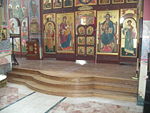Difference between revisions of "Ambon"
m (rv vandal) |
m (ro) |
||
| (4 intermediate revisions by 2 users not shown) | |||
| Line 1: | Line 1: | ||
| − | + | The '''Ambo''', also '''Amvon''' or '''Ambon''', is an architectural feature of an Orthodox Christian [[church]] building. | |
| + | |||
| + | Historically, the ambo was originally a raised platform in the middle of the [[nave]] of the church, from which the [[Holy Scripture|scriptures]] were read during the [[Divine Liturgy]] and where the [[bishop]] is vested prior to the Divine Liturgy. Also, it is where he is enthroned (remains) until the [[Little Entrance]] with the Holy [[Gospel]]. Today, this practice may continue, usually in churches without pews. | ||
| + | |||
| + | The last public prayer of the Divine Liturgy is the "Prayer Before the Ambo". Originally, it was a prayer of thanksgiving said as the [[clergy]] descended the ambo at the end of the service. In ancient times, there was a large collection of Prayers Before the Ambo, written for the different [[feast days]] of the church year and for those occasional services, such as weddings and funerals, that called for celebration of the Divine Liturgy. | ||
| + | [[Image:AmbonStNicDC.JPG|right|thumb|150px|Ambon off the soleas - St. Nicholas Cathedral, Washington, D.C.]] | ||
| + | In the modern era, the raised platform immediately in front of the [[Royal Doors]] is part of the bema and forms a platform from which the [[deacon]] proclaims the litanies, from which the [[Gospel]] may be read, and the [[sermon]] and the dismissals are given by the [[priest]] during the [[Divine Liturgy|Divine Services]]. | ||
| + | |||
| + | As a projection of the bema, the Ambon may have one or more curved steps between it and the floor of the [[nave]]. The entire bema in front of the [[Iconostasis]] is called the [[solea]]. Generally, only the clergy and serving attendants walk on the ambo except when the faithful may be receiving the [[Holy Mysteries]]. Otherwise persons who need to walk from one end of the solea to the other step down from solea to the nave floor rather than walk across the ambo in front of the Royal Doors. | ||
| + | |||
| + | At those times that the ambo in the middle of the church is not needed, an [[icon]] on a stand may be placed there for veneration. | ||
| + | |||
| + | ==Sources== | ||
| + | *[[Wikipedia:Ambon_(liturgy)]] | ||
| + | *[http://www.newadvent.org/cathen/01382a.htm Ambo (in the Russian and Greek Church)] | ||
| + | |||
| + | ==External link== | ||
| + | *[http://www.newadvent.org/cathen/01381e.htm Ambo] | ||
| + | |||
| + | [[Category:Church architecture]] | ||
| + | |||
| + | [[ro:Amvon]] | ||
Latest revision as of 14:46, December 19, 2012
The Ambo, also Amvon or Ambon, is an architectural feature of an Orthodox Christian church building.
Historically, the ambo was originally a raised platform in the middle of the nave of the church, from which the scriptures were read during the Divine Liturgy and where the bishop is vested prior to the Divine Liturgy. Also, it is where he is enthroned (remains) until the Little Entrance with the Holy Gospel. Today, this practice may continue, usually in churches without pews.
The last public prayer of the Divine Liturgy is the "Prayer Before the Ambo". Originally, it was a prayer of thanksgiving said as the clergy descended the ambo at the end of the service. In ancient times, there was a large collection of Prayers Before the Ambo, written for the different feast days of the church year and for those occasional services, such as weddings and funerals, that called for celebration of the Divine Liturgy.
In the modern era, the raised platform immediately in front of the Royal Doors is part of the bema and forms a platform from which the deacon proclaims the litanies, from which the Gospel may be read, and the sermon and the dismissals are given by the priest during the Divine Services.
As a projection of the bema, the Ambon may have one or more curved steps between it and the floor of the nave. The entire bema in front of the Iconostasis is called the solea. Generally, only the clergy and serving attendants walk on the ambo except when the faithful may be receiving the Holy Mysteries. Otherwise persons who need to walk from one end of the solea to the other step down from solea to the nave floor rather than walk across the ambo in front of the Royal Doors.
At those times that the ambo in the middle of the church is not needed, an icon on a stand may be placed there for veneration.
